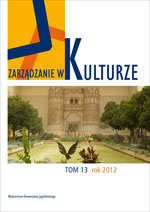Dziedzictwo kulturowe jako element promocji międzynarodowej i polityki rozwojowej Turcji
Cultural heritage as an element of international promotion and development policy of Turkey
Author(s): Renata Kurpiewska-KorbutSubject(s): Cultural Essay, Political Essay, Societal Essay
Published by: Wydawnictwo Uniwersytetu Jagiellońskiego
Keywords: Turkey; Anatolia; cultural heritage; strategy; development; promotion; Istanbul; AKP (Justice and Development Party); heritage protection; UNESCO (World Heritage List)
Summary/Abstract: For more than two decades now the protection of cultural heritage has been gaining in importance, becoming a global phenomenon and an important part of development strategies of countries, regions and cities. In general, the idea of development under the banner of culture and cultural legacy, usually occurring with the participation and promotion of the tourism sector, constitutes a component of comprehensive planning policies of many decision-making centers in the world, among others, Ankara. Turkey, which has an extremely rich and diverse cultural heritage, reflecting expressions of many cultures and civilizations, is a particularly interesting case study in this perspective. Currently, at least officially, the concept of heritage protection is interpreted by Turkish authorities as a process of revitalization and integration of entities with historical, cultural and architectural values with the economic, social and political potential as well as a matter of international diplomacy. However, the vision of benefits from new opportunities for use of cultural heritage both in large-scale development projects and foreign relations increasingly entails a number of negative effects. Failure of system implementation of legal protection of cultural resources, rapid population growth, uncontrolled urbanization, limited financial resources and different understanding or assessment of the historical and cultural environment make maintaining cultural heritage far more complex than in Europe. Similarly, taking advantage of the achievements of the Ottoman Empire to generate interest within the international community is removed from the process of building the culture and history of the whole society and recognizing its internal diversity. The future will show whether the Justice and Development Party government is interested in marking out the way for policies to promote a real protection of cultural heritage, cultural polyphony and putting it in the framework of a democratic vision. Or whether its priority remains the creation of a good image and reap short-term benefits from the use of the Anatolian legacy.
Journal: Zarządzanie w kulturze
- Issue Year: 13/2012
- Issue No: 1
- Page Range: 63-76
- Page Count: 14
- Language: Polish

